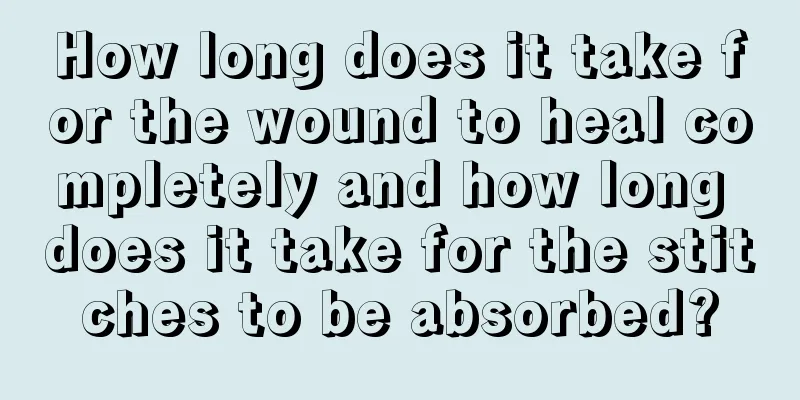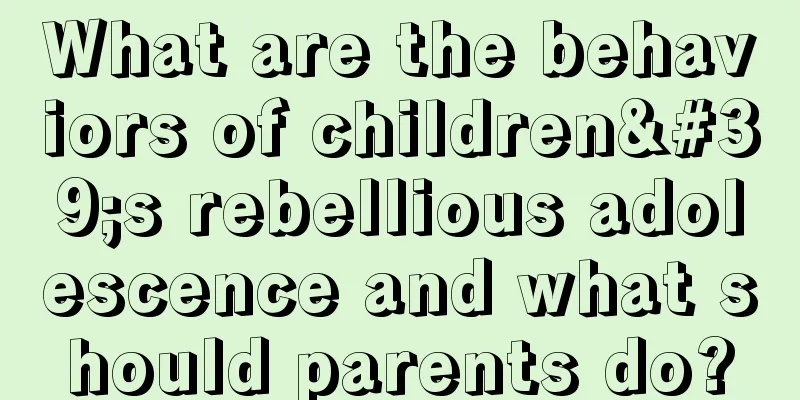What causes low blood sugar in babies? What to do if your baby has low blood sugar

|
Hypoglycemia in babies is a sign of malnutrition and is very harmful to children's health. Once parents find that their children have symptoms of hypoglycemia, they should immediately supplement their children with glucose, etc. So what causes hypoglycemia in babies? What causes hypoglycemia in babies?1. Related to meals: If children skip a meal or delay mealtime for a long time, they may become weak, dizzy or irritable, and some may even have difficulty concentrating. The reason why meals are related to hypoglycemia is that most of the blood sugar is used by the brain. When the brain lacks blood sugar supply, it is prone to thinking disorders and may even cause low mood, depression or irritability. Glucose is the only fuel available to the brain. When the level of glucose in the blood is low, the body, especially the brain, cannot obtain enough energy. At this time, even if there is a large amount of long-term energy reserves such as glycogen and fat, it takes time to convert it into glucose, so symptoms of hypoglycemia will still appear. 2. Mistaken ingestion of hypoglycemic drugs: If a child between 3 and 4 years old develops hypoglycemia, it may be caused by mistaken ingestion of hypoglycemic drugs. The mental development of children at this age often lags behind their mobility, and they cannot predict and control many risk factors. For example, if there is an adult in the family with diabetes and taking hypoglycemic drugs, and the child is not properly supervised and takes the drugs by mistake, it may cause a sudden drop in blood sugar and endanger his life. 3. Diabetes: Diabetes can also occur in children. It is a metabolic disease and is related to genetics. Therefore, even in childhood, children may suffer from type I or type II diabetes. Many children have ketoacidosis as the first symptom. Once diagnosed, hypoglycemic treatment should be carried out in time. However, blood sugar fluctuations or hypoglycemia may easily occur during the treatment process. What to do if your baby has low blood sugarIf your baby is found to have hypoglycemia, it is best to recommend timely treatment. Generally, newborn babies will be checked to see the degree of hypoglycemia. If it is too serious, they will be hospitalized for treatment. Other measures will be taken after the baby recovers, so as to avoid other diseases caused by hypoglycemia. However, if children are found to have low blood sugar, many people will directly transfuse intravenous glucose, which actually has a certain relief effect, so parents should not be anxious when they find such a situation. As long as it is discovered in time, take the baby to see a doctor, and then follow the doctor's advice to take certain treatments, it will soon return to normal. Some doctors will directly recommend oral glucose after examination, but it is best to take the right medicine under the doctor's advice, know how much to drink each time, and go for follow-up consultation in time. It may be better to add some glucose-rich complementary foods in daily life, because relying solely on drugs may cause dependence, and it is better to use natural foods as much as possible. The dangers of hypoglycemia in babiesBefore birth, the baby has been in an environment with high blood sugar in the mother's body, which leads to compensatory hyperplasia of pancreatic islet cells. After birth, the child's body is still in a hyperactive state of insulin, so within a few hours after birth, the child's blood sugar drops sharply and may suffer from hypoglycemia. In addition, premature babies, twins, and very low-weight newborns have less liver glycogen storage in their livers. If they are not fed in advance, they are also prone to hypoglycemia. Hypoglycemia is a common disease in newborns. If it is not diagnosed and treated in time, it can cause hypoglycemic brain damage. If treatment is delayed, it is more likely to cause mental retardation or cerebral palsy in children. If it is not treated in time, it can also lead to death. Symptoms of hypoglycemia in babiesBlood sugar is mainly used to supply energy to the body. Low blood sugar is primarily manifested by lack of energy, which can manifest as fatigue, dizziness, sweating, palpitations, and in severe cases, coma. If children have low blood sugar, they do not have typical symptoms and lack the ability to express themselves. Once the disease occurs, it is more dangerous than that of adults. Daily active observation can be used to judge. If the child is a newborn or infant who is in a worse mental state and sleepy than before, or a toddler or child who sweats a lot and complains of discomfort such as palpitations, dizziness, fatigue, etc., you need to be alert to the occurrence of low blood sugar. |
Recommend
Can pregnant women eat turkey? It has high nutritional value.
Pregnant women can eat turkey. The nutritional va...
Can mouthwash improve periodontitis? Can mouthwash improve tooth decay?
Mouthwash does not whiten teeth. Its main functio...
Baby name naming method, baby girl name with nice meaning is recommended
Every parent wants their baby to have a nice name...
How old can babies eat mooncakes? Can one-year-old babies eat mooncakes?
How old can babies eat mooncakes? The Mid-Autumn ...
What are the signs before childbirth? Three major symptoms of labor pain, bleeding and water breaking
The signs of labor include labor pains, water bre...
What are the dangers of diabetes during pregnancy? What are the dangers of high blood sugar during pregnancy to the fetus?
Diabetes is a disease that we are all familiar wi...
Why does the baby sleep with his mouth open? How to correct the baby sleeping with his mouth open?
It's cute for babies to sleep with their mout...
Why do you need to shave before giving birth? Does it hurt to shave before giving birth?
Childbirth is the most difficult time in a woman&...
What are the common misunderstandings about weaning? Don't empty your breasts
Breast milk is naturally the most nutritious food...
Can children eat nectarines? Can babies eat nectarines?
Summer is here, and peaches are about to hit the ...
What is milk spurt? 5 tips to stimulate milk spurt
Milk letdown is an experience that every breastfe...
How to name a newborn baby? What are the methods for naming a child?
Everyone must have heard of a lot of weird names ...
How to lose weight after giving birth? How to reduce waist and belly after giving birth to second child? Complete guide to reduce waist circumference from 80 to 62 cm
The leftmost picture below was taken by my husban...
Can pregnant women eat longan? Is it good for pregnant women to eat longan?
Longan is a very common fruit. It has good nutrit...
How can parents build their children's self-confidence?
If you want your child to grow up happily and hav...









